How to Help Your Kid Transition to Teenager

How to Help Your Kid Transition to Teenager
Here’s a list of some ways in which you can help your soon-to-be-teen to tame their brain and minimize the discomfort (and idiocy) that come with their teen years.
Written by Liz Bayardelle, PhD | See Comments | Updated 09/06/2019
Want to cut to the chase?
Kids' Chore Chart

How to Help Your Kid Transition to Teenager
This post contains some affiliate links for your convenience. Click here to read my full disclosure policy.
The adolescent brain works differently.
During this period of their lives, your children will be making odd decisions, follow surprising trends, and act in infuriating ways on the best of days. Unfortunately, the brain of teenagers is in the process of transitioning between childhood and adulthood.
At this stage, it is in a perpetual state of confusion and trying to adjust to a constant rush of hormones causing imbalance and mood swings, new information, and the difficulty and trauma of growing up.
Being a teen is not easy.
As a parent, you know that the best thing you can do to accompany them along the way is to be a positive and helpful influence, even during their darkest days. Here’s a list of some ways in which you can help your soon-to-be-teen to tame their brain and minimize the discomfort (and idiocy) that come with their teen years.
Emotional Support for Mama: The Pool Metaphor
The best metaphor I've ever read for a kid’s teenage years is that of a swimming pool.
If the real world is like a pool, adulthood is the deep end, and you are the edge of the pool. They're going to cling to you when they're scared and push you away as hard as they can when they feel adventurous enough to try in the deep end for a while. Then, the second they get tired, they will come cling to you again while they catch their breath.
The reassuring part about this metaphor is that it has absolutely nothing to do with you when they push you away. You are a solid, immovable object in their life. You are the one thing they know isn't going anywhere and is strong enough to withstand them pushing against you and they need to go someplace.
This is a useful metaphor emotionally, but it's also useful from a discipline standpoint. There would be nothing more unnerving in the world than having the side of the pool suddenly move while you're swimming.
Even though teenagers push against our rules, it makes them safe to know that they are there. Everything in the life of a teenager is changing, so knowing that parents and the rules they said are absolutely fixed and immovable makes them feel like there is some sense of safety, security, and stability in their lives. You don't need to be a mean, authoritarian parents. You don't need to run your house like North Korea. However, when you set up a rule, the worst thing you can do is give your teenager exception after exception, mulligan after mulligan. Even that when they outwardly resent rules, the fact that there still is some structure in place in their lives makes them feel immensely more secure in their teen years.
With that said, as a parent, here are three not fun things you should do and three fun things you should do as your kid transitions to being a teenager.
Do The Not Fun Stuff
#1: Stress the Value of Academics
High school is where grades actually start to matter. While elementary and middle school builds skills, there’s an immediate correlation between high school GPA, what college they go to, and the ease of their transition into the working world.
Even if you don’t plan on being a “Yale or bust” type of mom, it’s important for you to teach them that actually caring about their job (even if they don’t enjoy it) is an important life skill. And doing well in school is their job right now.
However, you also have to accept that everybody has different learning patterns and routines. Unfortunately, where you could dictate everything in their schedules in earlier years, it’s more important now that you let them create their routine. Respecting their pace, preferences, and studying habits is crucial.
At least at first, trust them to get on with what needs to be done and respect their privacy. If their grades start slipping, help them figure out a solution rather than handing it to them. You’re more in the “teach them to fish” mode than the “slap them in the face with a trout” mode you used in elementary and middle school. They’ll have to problem solve their own crises as an adult, so let them fail every once in a while and then help them through the process of putting the pieces back together.
#2: Don’t Stop Teaching Them Financial Responsibility
Teenagers are growing up in a society of consumerism. They are, of course, full of demands about the latest luxuries of their age. The days of teddy bears and chocolate candy bars are long gone. What teens want has a more practical value.
How you deal with it when your teen wants something expensive, such as a smartphone or a laptop is a true art form.
Needless to say, as a parent, you’re probably going to think twice about buying them a gift. Ultimately, there’s no denying that a laptop can dramatically improve their chances at school. However, you have to make them earn it.
I’m a huge fan of designing a chore chart specifically for your teen (or actually way sooner than that, but it’s never too late) so they really conceptualize the value of money before they get into the “real world” of rent, gas bills, and choosing between groceries and going to a movie.
I’ve never seen a look of shock on my teen’s face like the one when we translated the price of something she wanted into how many hours it would take her to earn that amount babysitting. Now that is how we present all prices to her. Oh you want that name-brand sweatshirt? That’s 9 hours babysitting, please. Even if it doesn’t happen that way, translating things into a billable rate is never a bad practice to start instilling early and often. It’s also a great way to show them the importance of education by illustrating what something would be at minimum wage versus a lawyer’s billable rate.
The real world sucks enough when you’re prepared for it. Don’t let your teen exist in a happy little bubble of free parent-bought goodies for too long or they’re in for a rude awakening.
#3: Don’t Freak Out When They Become Room-Dwelling Cave Monsters
It’s an unfortunately true stereotype that teens retreat into their rooms, close the door, and only reappear for food.
The crazy part is that this isn’t necessarily a bad thing.
(Caveat: If they’re doing something legitimately bad in there it is a bad thing. This includes stuff like venturing onto the seedier areas of the internet, trying out drugs, or other non-grey-area bad things. If you suspect this, take the appropriate parental measures against them. We don’t have locks on any of our kids doors. They know we’ll always knock, but it’s important they know they have the right privacy without having absolute secrecy.)
This caveat aside, having time alone can be good for your teen. They’re wrestling with all kinds of big, scary thoughts, trying to put on a new identity, and testing out how it will feel in a few years when they don’t live with you any more.
Alone time allows them to clarify their thoughts and develop their creative skills. Social withdrawal can be a force for good when it comes to ideas and creativity. In other words, if your teen spends long hours in their room, don’t see it as an excuse to ask their younger siblings to check on them.
Make sure they spend some time with the family. Make sure they spend some time off their phones/computers/iwhatever. But don’t worry too much if they hole up. As long as they’re not neglecting their other responsibilities (school, extracurriculars, etc.) they have a lot of thinking to do in there.
Also Do the Fun Stuff
#1: Change Up Their Bedroom
Whether we like it or not, becoming a teen includes a fair amount of distancing oneself from one’s childhood.
Even if you have to remind yourself of this 200 times a day (my record is 209 I think), try to remember that this is them saying “I’m not a kid anymore” not saying that you did anything wrong. If you look at it from the perspective of helping them develop an adult self (and by that I mean subtly guiding them while not giving any impression that you’re actually needed in any way...because they’re too big for that) it’s much easier to stomach.
One thing that can actually make this transition a lot easier is changing up their physical environment.
Even if you can’t or don’t want to give them a full renovation of their bedroom, it’s not hard to do small and inexpensive things like changing up their bedspread or even free things like rearranging their furniture. If you want to add in a touch of financial responsibility training, give them a fixed amount of money to spend at Target to furnish their “adult” room and let them make themselves a budget.
If you’re more the “go big or go home” type, you can make an even more drastic change. Many families opt to convert an unused room or space into a new room for a teen. By adding windows to a newly insulated attic or giving the basement direct access to electricity and heating you can give your moody beast a fresh domain for their “adult” space.
It’s not always feasible, to do huge changes, but giving them some visual demarcation that they aren’t a kid anymore can really be a huge psychological help with the change into teenagerdom.
#2: Splurge the Right Way
The area of the brain that is in charge of impulse control grows massively around the time you turn 18-21.
The area of the brain that is in charge of sensation-seeking grows massively around the time you turn 12.
For those of you with the ability to subtract, this seems like quite a problem. And it is. The teenage years are so ridiculous because your teen is getting all kinds of impulses to do crazy, exciting things without the neurological structure in place that tells them it's a bad idea.
As a parent, it's important you don't deprive your teen of exciting experiences. Everyone should have crazy stories of when they were a teenager to tell later on in life once our impulse control has kicked in and we no longer feel the urge to jump off bridges or go surfing on the top of cars.
However, it is also our job to make sure our teens get their excitement in safe, legal, and not-detrimental-to-their-future ways.
One great way to do this is by letting your teen splurge on activities rather than material possessions. Instead of buying another piece of crap for their room as a birthday present, let them pick out a concert they want to go to with a friend, enroll there old social group in an adventure race or something that they would find genuinely enjoyable. By giving them a little extra funding to do exciting Adventures, you make it less likely that they're going to have to make their own excitement in ways that might not be as acceptable (or safe...or legal).
#3: Entice Them Out of Their Hidey Holes
This one does take a little bit of creative thinking.
Teenagers, while they seem like moody horrible creatures, still do want to be part of the family and have fun as such. It just takes a little bit of Ingenuity to find out exactly how to do that.
While every teenager is different, I can tell you what works in our household.
Our teenager does not like to be seen with our family in public. She is in that “parents are the most embarrassing thing in the world” phase, so it would be completely counterproductive to try to do anything with her in a place where we could be witnessed by her friends. However, if we take her somewhere she knows she's not going to run into anyone she knows, she's going to be a much more willing participant in the activity.
Take your teenager is preferences into account and try and suggest things that would actually be fun for them.
You may be a huge gym rat, but if your teenager is idea of cardio is pausing Netflix to go get more Cheetos, bringing them to your swanky gym might not be as appealing as you might think. on the flip side, if your teen is into all kinds of activities, you might have to lace up your hiking boots and paint your way up the side of a mountain is that's the way they enjoy spending their time.
Try to get into the brain of your teenager and, when suggesting family activities, pick things that will be too tempting for them to pass up. They do secretly we still want to have fun with you, they just want to do it on their terms.
Moderation and It’s-Not-You: Your Mantras for the Teen Years
Being the parent of a teenager is just as terrifying as being a teenager, but for very different reasons.
This is a transition for everybody, so give everyone, yourself included, and equally Long Leash. Just like the terrible twos when you wanted to wring their neck has a toddler, this phase will eventually pass and you will have a mostly sane, mostly functional adult human being to show for it. Just keep them alive, don't take it personally, and take lots of deep breaths throughout the process.
As long as you can successfully keep your child from permanently damaging their bodies, academic careers, or legal records during their teenage years, you're doing a fine job. It's their job to figure everything out, not yours.
As long as you are there as a reliable, predictable support system for them while they are figuring all of these teenage hormones fuelled emotions, that's all anyone can ask of you.
Start Your Next Step
Kids' Chore Chart

Get Sanity, Delivered to Your Inbox.
Care to Share?
About the Author

Liz Bayardelle, PhD
Founder | Contributor
Liz (or Dr. Mommy, as her toddler started calling her after learning what a PhD was) is the happily sleep-deprived mom of a toddler (and professional raccoon noise impersonator), a sparkle-clad kidnado, a teenage stepdaughter, 200 cumulative pounds of dog, and herd of dustbunnies (if daily vacuuming doesn't occur). During nights and naptimes, she uses her PhD in business psychology as an author, speaker, and consultant. She also serves as an executive and principal for three companies, two of which she co-founded with her very patient (and equally exhausted) husband.





-Budget.jpg)